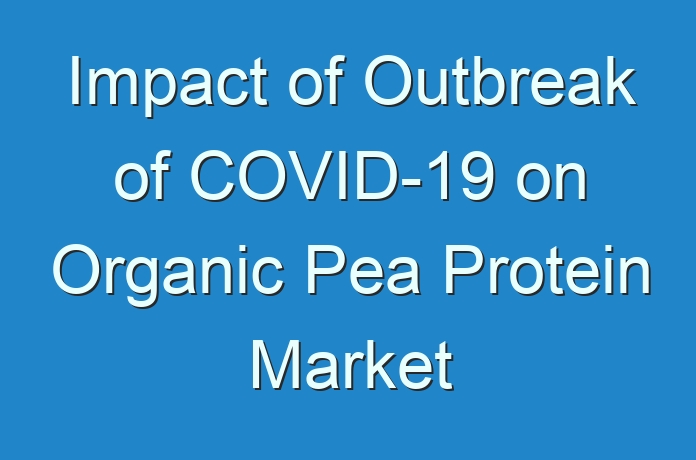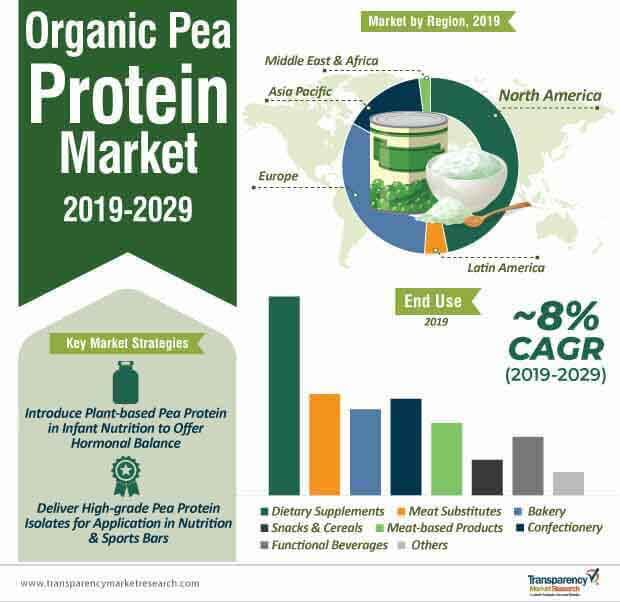
Infant Food Products Made from Plant-based Organic Pea Protein
The high protein content of organic pea protein has instigated players in the pea protein market to increase its application in dietary supplements, meat substitutes, and confectionaries. Manufacturers in the organic pea protein market are also increasing their production capabilities of infant nutrition. Organic pea protein is used as a substitute for soy protein to offer hormonal balance in infants. As soy contains phytoestrogens that create hormonal imbalance in babies, manufacturers are resorting to plant-based pea protein to produce baby food. For instance, Nature’s One – a producer of organic food products for infants, announced the launch of Baby’s Only Organic® Pea Protein Formula – the first-of-its-kind infant food product made from plant-based pea protein.
Request Brochure:
https://www.transparencymarketresearch.com/sample/sample.php?flag=B&rep_id=30290
Since soy has the tendency to absorb minerals and contaminants from the soil during its cultivation, manufacturers in the organic pea protein market are streamlining their production processes by introducing pea protein in baby food. This practice will help improve the quality of infant food products and largely benefit consumers.

More Trending Reports by TMR:
Pea Protein Isolates Increasingly Found in Dietary and F&B Applications
Manufacturers in the organic pea protein market are developing products that are more consumer-centric. They are also making conscious efforts to meet the needs of food and beverage (F&B) manufacturers. For instance, the dietary supplements sector accounted for the highest revenue in 2018, with a value of ~US$ 12 million in the organic pea protein market. This sector will continue to dominate the market throughout the forecast period.
Manufacturers are increasing their research capabilities to innovate in senior nutrition, sports nutrition, and gluten-free products. Weight management is one of the key drivers that has triggered the growth of the organic pea protein market. With increasing number of diet- and health-conscious consumers, manufacturers are increasing awareness about the ‘non-GMO’ labels for their products.
Consumers are increasingly demanding organic products that are sans artificial colors and additives. To address this trend, manufacturers are introducing organic pea protein isolates that replace a significant percentage of proteins in food products, without altering the color, taste, or texture of the ingredients. For instance, Ingredion – a leading ingredients solution company, announced the launch of VITESSENCE® Pulse 1803 organic pea protein isolate, which can be used in several food and beverage applications.
Buy Now:
https://www.transparencymarketresearch.com/checkout.php?rep_id=30290<ype=S
Organic Pea Protein V/S Meat Substitutes: Which one Will Dominate Market Growth?
The desire for a healthier diet and concerns about climate change have also triggered the growth of the organic pea protein market. These aspects have catalyzed consumer interest in plant-based alternatives to manifest animal welfare, and farmers and society well-being. The proliferation of veganism has further created the scope for incremental opportunities in the coming years.
The production of pea protein is comparatively cost-effective as compared to wheat, corn, and soy. This is because the cultivation of peas requires less water; they are drought-tolerant and reduce the need for nitrogen fertilizers. However, insufficient supply of pea protein acts as a hurdle for manufacturers in the organic pea protein market. On other terms, stakeholders in the meat and dairy alternatives market could leeway out of this pain point to gain competitive advantage. Thus, manufacturers need to team up with existing market players to maximize the supply chain in the market.





